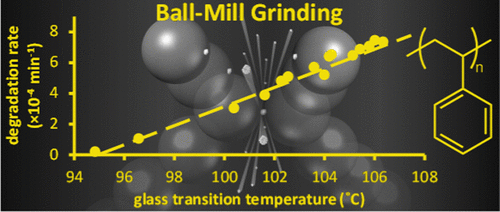当前位置:
X-MOL 学术
›
Macromolecules
›
论文详情
Our official English website, www.x-mol.net, welcomes your
feedback! (Note: you will need to create a separate account there.)
Mechanochemical Degradation of Amorphous Polymers with Ball-Mill Grinding: Influence of the Glass Transition Temperature
Macromolecules ( IF 5.1 ) Pub Date : 2020-09-07 , DOI: 10.1021/acs.macromol.0c01510 Gregory I. Peterson 1 , Wonyoung Ko 2 , Ye-Jin Hwang 2 , Tae-Lim Choi 1
Macromolecules ( IF 5.1 ) Pub Date : 2020-09-07 , DOI: 10.1021/acs.macromol.0c01510 Gregory I. Peterson 1 , Wonyoung Ko 2 , Ye-Jin Hwang 2 , Tae-Lim Choi 1
Affiliation

|
The influence of ball-mill grinding process parameters and polymer properties on the mechanochemical degradation of amorphous polymers was explored. For process parameters, the grinding frequency was found to have the greatest impact on the degradation rates of polystyrene (PS), with ca. 17 times difference in rate constants between the lowest and the highest frequencies studied. For polymer properties, molecular weight and molecular weight dispersity were shown to both influence degradation rates but in an indirect manner. Linear relationships were found between degradation rate constants and the initial glass transition temperature (Tg) for PS and poly(methyl methacrylate) samples, suggesting that the Tg was a better predictor of the degradation rate than molecular weight (above a limiting molecular weight value). Ultrasonication experiments also further highlighted that polymer properties can have a disparate impact on mechanochemical reactivity depending on the method used to apply mechanical forces to polymers.
中文翻译:

球磨研磨对非晶态聚合物的机械化学降解:玻璃化转变温度的影响
探索了球磨机的研磨工艺参数和聚合物性能对非晶态聚合物机械化学降解的影响。对于工艺参数,发现研磨频率对聚苯乙烯(PS)的降解速率具有最大的影响,约为。最低频率和最高频率之间的速率常数相差17倍。对于聚合物性质,分子量和分子量分散度均显示出降解速率的间接影响。发现PS和聚甲基丙烯酸甲酯样品的降解速率常数与初始玻璃化转变温度(T g)之间存在线性关系,这表明T g比分子量(超过极限分子量值)更好地预测了降解速率。超声实验还进一步强调,取决于用于对聚合物施加机械力的方法,聚合物的性质会对机械化学反应性产生不同的影响。
更新日期:2020-09-22
中文翻译:

球磨研磨对非晶态聚合物的机械化学降解:玻璃化转变温度的影响
探索了球磨机的研磨工艺参数和聚合物性能对非晶态聚合物机械化学降解的影响。对于工艺参数,发现研磨频率对聚苯乙烯(PS)的降解速率具有最大的影响,约为。最低频率和最高频率之间的速率常数相差17倍。对于聚合物性质,分子量和分子量分散度均显示出降解速率的间接影响。发现PS和聚甲基丙烯酸甲酯样品的降解速率常数与初始玻璃化转变温度(T g)之间存在线性关系,这表明T g比分子量(超过极限分子量值)更好地预测了降解速率。超声实验还进一步强调,取决于用于对聚合物施加机械力的方法,聚合物的性质会对机械化学反应性产生不同的影响。































 京公网安备 11010802027423号
京公网安备 11010802027423号